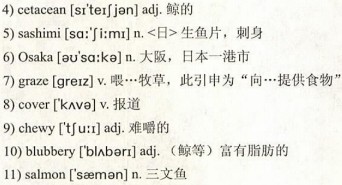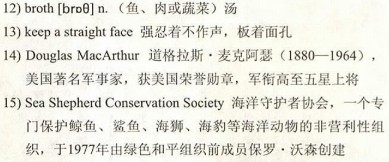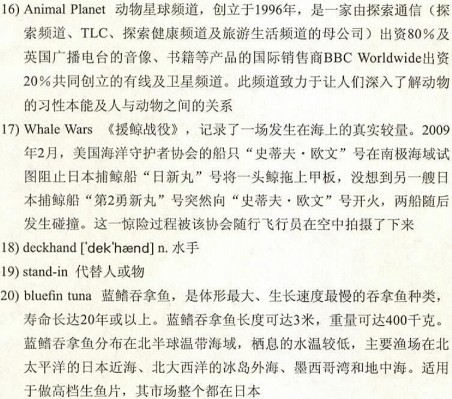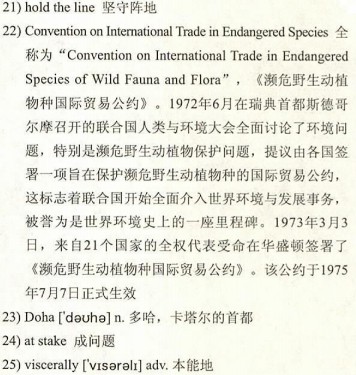文字难度:★★★
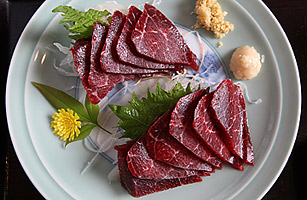 While the team behind The Cove, the hidden-camera documentary about dolphin slaughter in Japan, was in Los Angeles this March accepting an Oscar for Best Documentary, it took a 1)detour to help carry out another 2)undercover sting operation—this time at a Santa Monica sushi restaurant.
While the team behind The Cove, the hidden-camera documentary about dolphin slaughter in Japan, was in Los Angeles this March accepting an Oscar for Best Documentary, it took a 1)detour to help carry out another 2)undercover sting operation—this time at a Santa Monica sushi restaurant.
Together with federal officials, the team members discovered evidence that a restaurant called the Hump—really—was secretly serving whale meat, in violation of the Marine Mammal Protection Act. When confronted, the restaurant accepted responsibility for serving whale, and now faces a fine of up to $200,000. As Andre Birotte Jr., a 3)U.S. Attorney on the case, told the New York Times, “Someone should not be able to walk into a restaurant and order a plate of an endangered species.”
Which leads to the question—who would possibly eat whale meat?
Well, for one: me.
Before you begin flooding the Internet with electronic hate mail—or contacting the nearest U.S. attorney—you should know that my eating whale was a onetime thing and it happened in Japan, where eating whale is not only legal but sometimes considered a national right. (Japan is not the only country to refuse to accept the whaling ban, but it’s the only one that pursues whale in any significant way.)
《海豚湾》是一部用隐蔽摄像机暗中拍摄,反映日本渔民捕杀海豚的纪录片。今年三月,此纪录片的制作团队在洛杉矶获得奥斯卡最佳纪录片奖,而这群人也趁机秘密展开了另一项棘手的调查——这次调查的对象是位于美国加州圣莫尼卡市的一家日本寿司店。
该团队联同联邦官员,找到证据证明一家名叫“亨姆普”的餐馆的的确确暗地里提供鲸鱼肉食,公然违反《海洋哺乳动物保护法》。受到当面对质时,该餐馆承认出售鲸鱼肉,如今它面临最高可达20万美元的罚款。负责此案的美国联邦检察官小安德烈·白若提告诉纽约《时代周刊》的记者:“总不能让人走进餐厅随便就可以叫一盘濒危动物的肉来吃”。
这引发了一个疑问——谁可能会去吃鲸鱼肉?
好吧,举个例,我。
在你们开始蜂拥上网给我发来声讨邮件,或是联系最近的美国律师要起诉我之前,你应该知道,鲸鱼我就仅仅吃过一次。我是在日本吃的,在那里,吃鲸鱼不仅合法,有时还会被看作是日本的一项国民权利。(日本不是唯一一个拒绝接受捕鲸禁令的国家,却是唯一一个千方百计捕鲸的国家。)
In June 2005 I attended an annual whale-tasting event held by the Japanese Whaling Association at the national legislature in Tokyo. Restaurants from around Japan served their best 4)cetacean recipes—whale sushi, whale5)sashimi, whale on crackers, canned whale, whale with 6)Osaka noodles—to black-suited Japanese legislators, who 7)grazed from one table to the next.
So I had to try it. When you 8)cover a whale-tasting event, you have to taste whale. And morality aside, I can tell you that whale meat isn’t good. As sushi and sashimi, it was fatty and 9)chewy with a bland, 10)blubbery taste—like 11)salmon that’s been kept out too long. The one exception was the whale noodle dish, but I’m going to say its success had more to do with the noodles and spicy 12)broth than it did with the whale. All in all, the experience made it hard for me to 13)keep a straight face when people referred to whale as a “delicacy.” It was like eating leftovers from a submarine.
Indeed, even in Japan, whale meat isn’t that popular. Though some coastal towns have hunted whale for centuries, relatively few Japanese ate whale regularly before the postwar years, which is when it took off. What changed? Blame U.S. General 14)Douglas MacArthur, head of the U.S. occupation of Japan, who thought whale meat would be a cheap source of protein for an impoverished country and effectively launched the modern Japanese whaling industry. A generation of Japanese schoolchildren grew up accustomed to having whale in their lunch boxes.
But it’s been decades since Japan could be described as impoverished, and a 2008 survey found that 95% of Japanese either eat whale meat very rarely or not at all. The fishing company that owns Japan’s whaling ships estimated that annual per capita consumption from its catch might amount to less than four slices of sashimi a year. If Japanese whaling—which is allowed under the international ban only on a very small scale, as “scientific research”—ended tomorrow, your average salaryman in Osaka would barely notice.
2005年6月,我参加了一个由日本捕鲸协会在东京国家议会举办的年度鲸鱼宴。全日本的餐厅向穿着一身黑色西装的日本议员们献上他们最好的鲸鱼菜式——鲸鱼寿司、鲸鱼刺身、鲸鱼饼、腌制鲸鱼肉、鲸鱼大阪面,让食客轮流品尝。
所以我也不得不品尝一下。当你要对这样的鲸鱼宴进行报道时,你就不得不品尝鲸鱼肉。撇开道义不管,我可以告诉你,鲸鱼并不好吃。寿司和刺身里的鲸鱼肉淡而无味,肥腻难嚼,嚼起来满嘴都是鲸脂的味道——像放久了不新鲜的三文鱼。唯一例外的是鲸鱼面料理,但我得说这碗面之所以好吃更多是因为面条及辛辣的汤料的关系,而非鲸鱼肉本身。总之,这次体验让我在人们将鲸鱼肉称作美味佳肴时很难强忍着不作声。鲸鱼肉吃起来就像一艘潜水艇上的残羹冷炙。
事实上,即使在日本,鲸鱼肉也不是那么受欢迎。尽管有些沿海小镇的捕鲸史长达几个世纪,在二战结束之前,吃鲸鱼的日本人还是相对比较少的。他们也是在二战后才开始逐渐流行吃鲸鱼肉的。那是什么缘故?这要怪战后驻日美军总司令道格拉斯·麦克阿瑟。他认为对于一个贫穷的国家来讲,鲸鱼肉是种廉价的蛋白质来源,于是大力促成了现代日本捕鲸业的出现。整整一代日本人在学童时期都习惯了以鲸鱼肉作为午餐的一部分。
但日本被形容为“赤贫之国”已是几十年前的事了。2008年的一项调查发现,95%的日本人极少吃或根本不吃鲸鱼肉。拥有日本捕鲸船只的捕鲸公司估计,他们的年捕捞量所对应的人均鲸鱼消费量可能少于每年4片鲸鱼刺身。如果日本捕鲸业(基于国际禁令,捕捞量需控制在非常低的水平,仅作为“科学研究”之用)明天就彻底结束,大阪的上班族对此根本难以察觉。
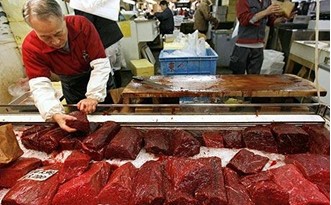
And yet the whale wars continue—and even seem to be worsening. In January a vessel belonging to the 15)Sea Shepherd Conservation Society, a group that tries to disrupt Japanese whaling on the high seas, was badly damaged in a collision with a Japanese whaling ship. On March 12, the Japanese Coast Guard in Tokyo arrested Peter Bethune, a member of Sea Shepherd, after he tried to board a whaling ship without permission in February.Yet Sea Shepherd—the subject of the popular16)Animal Planet reality show 17)Whale Wars—isn’t holding back. “Nothing is going to keep us from trying to save whales,” says Laurens de Groot, a 18)deckhand on a Sea Shepherd vessel. “We’re not going to stop.”
But neither is Japan. In part, the Japanese may be protecting their right to whale as a 19)stand-in for a separate issue they actually care about: fishing for20)bluefin tuna, which is popular in sushi. The Japanese eat an estimated 80% of the world’s catch of the species, which many scientists believe is in danger of being fished out of existence. If Japan21)holds the line on whaling, the argument goes, it would send a signal that limits on bluefin tuna aren’t up for debate either.
We’ll see if that message gets through. At the meeting of the 22)Convention on International Trade in Endangered Species, beginning on March 13 in 23)Doha, the E.U. and U.S. will push for a ban on international trade of the bluefin. Japan has already said it would oppose the ban, but Tokyo faces an uphill battle. “A ban is the only possibility to prevent a total collapse of this species,” says Sergei Tudela, Atlantic bluefin tuna expert for the World Wildlife Fund.
But there is more than just fish politics and food culture 24)at stake for Japan when it comes to whaling. Even though few Japanese ever sit down to a plate of whale sashimi, they still resist 25)viscerally the idea that the international community could force Japan to stop whaling. They have gotten tired of the world telling it what to do. As a Japanese chef told me at that whale festival in 2005, “If other people don’t want to eat whale, that’s fine. But we should be allowed to do what we want.” A side of national pride makes a blubbery dinner go down a lot easier.
然而,关于捕鲸的争斗仍在继续着,甚至有愈演愈烈的趋势。一月,致力阻止日本在公海捕鲸的海洋守护者协会的一艘船与一艘日本捕鲸船发生撞击,损坏严重。3月12日,东京的日本海上保安厅逮捕了海洋守护者协会成员彼得·贝休恩,起因是彼得·贝休恩在二月曾试图在未获得许可的情况下强行登上一艘捕鲸船。然而,海洋守护者们并未就此退缩。动物星球频道的流行真人秀节目——《援鲸战役》记录的正是他们的真实故事。“没有什么能阻止我们拯救鲸鱼,”海洋守护者协会的一名水手劳伦斯·德·格鲁特说道,“我们不会就此打住的”。
但日本也不会罢休。从某种意义上说,日本保护捕鲸权利也许实际上是为了保护另一个他们更在意的权利:捕捞蓝鳍吞拿鱼——寿司界的“宠儿”。日本人消费的蓝鳍吞拿鱼占了全球该物种总捕捞量的80%,许多科学家认为该物种因人类的不断捕捞,正濒临灭绝。如果日本能守住捕鲸这一权利,让这个争论持续下去,那将会发出一个信号——蓝鳍吞拿鱼的捕捞限制还不会成为争论议题。
这个讯息是否能发出,我们将拭目以待。3月13日在多哈召开的《濒危野生动植物种国际贸易公约》会议上,欧盟和美国将推动通过一项蓝鳍吞拿鱼的国际贸易禁令。日本已表态将抵制该条例,但东京正面临一场硬仗。“该禁令是唯一可能阻止这个物种彻底灭亡的途径。”来自世界野生动物基金会的大西洋蓝鳍吞拿鱼专家谢尔盖·图德拉说道。
当涉及捕鲸问题,日本面临的不仅是捕鱼政策和饮食文化的问题。即使只有极少数日本人曾坐下来品尝一盘鲸鱼刺身,但一提到国际社会要强迫其停止捕捞鲸鱼,日本仍会本能地抵制。日本已经厌倦了国际社会对其指手画脚。正如一个日本厨师在2005年那次鲸鱼宴上告诉我的:“如果其他人不想吃鲸鱼,那没关系啊。但我们应该有权做我们想做的事。”这份民族自豪感使得肥腻的鲸鱼肉不那么令人难以下咽了。
《海豚湾》——记一场令人膛目的杀戮
在日本南部,拥有海豚路标和建筑的渔村太地町,并非是一个热爱海豚的小镇。相反,在这三面环海的美丽海湾,却更像是一个海豚的“集中营”。每年9月至次年2月的捕鲸季,都会成为海豚的受难季。每天傍晚,太地町的渔民们驾着十几艘小船开往海豚聚集的海口,从船上将一根长杆置入海中,不断敲打并制造出一排声浪,目的是让海豚这种主要依靠敏锐听觉生存的动物受到惊吓。随后,渔民们会开船将海豚驱赶到用渔网封锁的礁湖之中。第二天清晨,来自全球各地的贸易商会前来挑选适合在水族馆进行表演的海豚。一头特别聪明的海豚可能会卖出10万英镑的高价。一旦这些贸易商挑选完毕,剩下的海豚就只能等待被屠杀的命运。渔民们会用长钩刀砍杀海豚,用削尖了的长枪将其刺伤,然后拉上小船,割断它们的喉咙,或者砍开它们的脊髓。更多的海豚则会被留在船上,任其自然死亡。日复一日的杀戮,会整整延续6个月,而在这期间,单就太地町每年会有两千多头海豚被屠杀……这是美国纪录片《海豚湾》呈现的真实一幕,震惊、愤怒、痛心、流泪、反思、质疑、行动,这些关键词都成为看过《海豚湾》的影迷描述其心情时必不可少的词汇。
站在奥斯卡的领奖台上,导演西霍尤斯高举着一块抵制屠杀海豚的牌子直言,“直到这些海豚不再被屠杀,我才真正获得了奥斯卡奖。”


